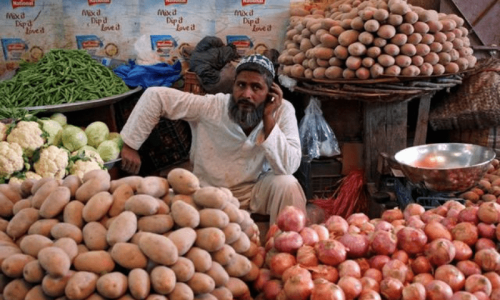ISLAMABAD: The short-term inflation witnessed a year-on-year increase of 26.32 per cent for the week ending on Aug 7 mainly due to a sharp increase in the retail price of sugar across the country and petroleum products, showed the official data released on Friday.
According to the PBS, the highest recorded retail price of sugar, reaching Rs200 per kg, was observed in Quetta and Peshawar, followed by Rs195 in Karachi and Rawalpindi, Rs190 in Islamabad and Rs180 in Faisalabad, Sialkot, Multan, Gujranwala, Hyderabad, Sukkur and Larkana.
The national average price maximum stood at Rs200 per kg.
Sugar became more expensive because of two reasons. A lot of sugar was taken out of the country through smuggling. Also, the PDM government has allowed legal exports of sugar since February.
According to sources, nearly 800,000 tonnes of sugar have been smuggled across the western border. At the same time, the PDM government has allowed the export of 250,000 tonnes of sugar since February. The ECC has banned the export of the sweetener in early August.
The short-term inflation, measured by the Sensitive Price Index (SPI), remained elevated. It, however, increased 0.96pc from the preceding week, showing a rising trend for the past seven consecutive weeks.
In the energy sector, the price of diesel rose by 6.28pc, LPG 5.19pc and petrol 5.12pc, respectively. In the past two weeks, the government has increased petroleum prices unprecedentedly. The real impact of petroleum products is expected in the next week’s data.
Of the 51 items in the SPI basket, prices of 32 goods soared, five dropped and 14 remained unchanged compared to the previous week.
During the week under review, the items whose prices increased the most over the same week a year ago were: wheat flour (117.71pc), gas charges for Q1 (108.38pc), sugar (107.36pc), cigarettes (100.16pc), rice basmati broken (90.66pc), tea Lipton (88.41pc), chillies powder (86.05pc), rice Irri-6/9 (84.18pc), gur (72.83pc), gents sponge chappal (58.05pc), gents sandal (53.37pc), salt powdered (52.07pc), powdered milk (42.45pc) and bread (42.33pc).
The biggest rise week-on-week was in the price of tomatoes (17pc), pulse masoor (10.87pc), sugar (6.73pc), garlic (4.66pc), gur (3.62pc), pulse moong (3.55pc), onions (3.43pc) and pulse gram (3.25pc).
In May, the SPI stayed above 45pc for three weeks after hitting an all-time high at 48.35pc on May 4.
The rupee depreciation, rising petrol prices, sales tax and electricity bills are among the key contributors to this inflationary trend. According to the latest IMF forecast, the average Consumer Price Index (CPI) for the current fiscal year is projected to be 25.9pc from the previous year’s 29.6pc.
Meanwhile, a decrease was also observed on a week-on-week basis in prices of chicken (3.20pc), cooking oil 5-litre (1.03pc), vegetable ghee 2.5 kg (0.47pc), tea Lipton (0.43pc) and vegetable ghee 1 Kg (0.14pc)
Published in Dawn, September 9th, 2023















































Dear visitor, the comments section is undergoing an overhaul and will return soon.